|
|
|
Sort Order |
|
|
|
Items / Page
|
|
|
|
|
|
|
| Srl | Item |
| 1 |
ID:
087936
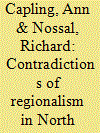

|
|
|
|
|
| Publication |
2009.
|
| Summary/Abstract |
Students of regionalism almost reflexively include North America in their lists of regions in contemporary global politics. Inevitably students of regionalism point to the integrative agreements between the countries of North America: the two free trade agreements that transformed the continental economy beginning in the late 1980s - the Canada-US Free Trade Agreement that came into force on 1 January 1989, and the North American Free Trade Agreement (NAFTA) between the United States, Mexico, and Canada, that came into force on 1 January 1994 - and the Secutity and Prosperity Partnership of North America (SPP), launched in March 2005. These agreements, it is implied, are just like the integrative agreements that forge the bonds of regionalism elsewhere in the world. We argue that this is a profound misreading, not only of the two free trade agreements of the late 1980s and early 1990s and the SPP mechanism of 2005, but also of the political and economic implications of those agreements. While these integrative agreements have created considerable regionalisation in North America, there has been little of the regionalism evident in other parts of the world. We examine the contradictions of North America integration in order to explain why North Americans have been so open to regionalisation but so resistant to regionalism.
|
|
|
|
|
|
|
|
|
|
|
|
|
|
|
|
| 2 |
ID:
148264
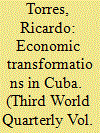

|
|
|
|
|
| Summary/Abstract |
After Raul Castro’s accession to the presidency of Cuba, the country has witnessed the most far-reaching process of economic reforms for more than five decades. The government has expanded the private and cooperative sectors, has passed a new foreign investment law, restructured most of its old debt and has sought to end the long-standing dispute with the USA. Yet economic performance has been poor and the country faces significant challenges and contradictions arising from the reforms. This paper analyses the macroeconomic environment and the changes introduced by the Cuban government over the period 2007–15. While successful at restoring macroeconomic equilibria, restrictive macroeconomic policies have hurt economic growth, whereas growth- and efficiency-enhancing measures are yet to produce results. Moreover, transformation of the economic model is slow because of its many internal contradictions. The paper also discusses some of the main impediments to future change.
|
|
|
|
|
|
|
|
|
|
|
|
|
|
|
|
| 3 |
ID:
151505
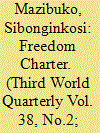

|
|
|
|
|
| Summary/Abstract |
The Freedom Charter represents a desire to create a society that is based on common citizenship and democracy in a society divided in all aspects of its life. This paper problematises and interrogates the Charter’s theoretical and philosophical claim on land. It uses the methodology of Afrocentricity and Africana critical theory to dispute the theoretical and philosophical basis of the Freedom Charter. The paper argues that the understanding, desire and vision of the Freedom Charter are irreconcilable. It concludes that the Charter reconciles the dispossessed with their dispossession, reflecting coloniality and white domination in South Africa.
|
|
|
|
|
|
|
|
|
|
|
|
|
|
|
|
| 4 |
ID:
099448
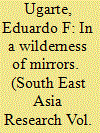

|
|
|
|
|
| Publication |
2010.
|
| Summary/Abstract |
Most media coverage of the 'Abu Sayyaf', an allegedly militant Islamist group or organization in the Philippines, derives ultimately from official sources, but the information provided by such sources has never been subject to scrutiny. To redress the oversight, this paper critically examines official and media accounts of the 'Abu Sayyaf'. Beginning with a survey of media reports from June 2007 to January 2009, it highlights the contradictions uncovered in the sample before accounting for such inconsistencies and other peculiarities in terms of Edward Herman and Noam Chomsky's propaganda model. Applying the model to the performance of the media in the southwestern Philippines, the paper then looks at the factors that render journalists in the region highly dependent on official sources for data, and hence vulnerable to state disinformation, before exploring the framework of presuppositions that influence popular representations of the 'Abu Sayyaf' and the troubles in the zone.
|
|
|
|
|
|
|
|
|
|
|
|
|
|
|
|
| 5 |
ID:
128093
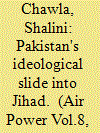

|
|
|
|
|
| Publication |
2013.
|
| Summary/Abstract |
Pakistan has been in existence for more than six decades but the state has not been able to define its identity till date. Pakistan has been a nation of contradictions; it has shared an ambiguous relationship with Islam, tried to embrace Western notions of modernity, and , at the same time, tried retaining the orthodox Islamic identity, has an overpowering and ambitious army which has ruled the nation for more than 30 years directly, and nearly an equal period with a civilian façade, but has still struggled periodically to go back to the domestic order controlled by the fractured political leadership and has suffered a deep national identity crisis. Lack of identity has encouraged the rise of ethnicity and pluralism with in the Pakistani society. Born as a result the demand of a separate Muslim homeland, it eventually stood as the saviour of Islam and, in the process, the military led state has adopted policies based on religion which have had severe repercussion for the state. Religion has been used in Pakistan for a range of issues from nation-building to strategic security,
|
|
|
|
|
|
|
|
|
|
|
|
|
|
|
|
| 6 |
ID:
134120
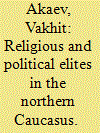

|
|
|
|
|
| Publication |
2014.
|
| Summary/Abstract |
This article highlights the main factors relating to the formation of the religious and political (Islamic) elites in the Northern Caucasus caused by Gorbachev's perestroika, the collapse of the Soviet Union, the reforms conducted in Russia, the creation of an ideological vacuum, and the birth of market relations. The sociocultural context that formed has given rise to an Islamic revival, the penetration of Salafi (Wahhabi) ideas into the region, and the formation of a neo-clergy that is not only claiming a leading role in the religious life of Muslims, but also active participation in politics, right down to preparing a state coup.
|
|
|
|
|
|
|
|
|
|
|
|
|
|
|
|
| 7 |
ID:
189783


|
|
|
|
|
| Summary/Abstract |
SPIRITUAL and moral values have served as a foundation for the evolution of Russian statehood throughout our country's history. Right now, forming, keeping, and promoting traditional spiritual and moral values is a priority policy issue in both domestic politics and international relations.
|
|
|
|
|
|
|
|
|
|
|
|
|
|
|
|
|
|
|
|
|